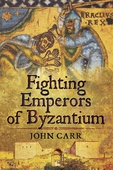
Lägg till önskelistan
Sparta’s Kings e-bok
Pris
115 kr
In ancient Greece, Sparta was unique in having a dual kingship – two kings from different clans, the Agiads and the Eurypontids, reigning simultaneously. The institution was already well-developed by the 8th century BC, when Theopompos of the Eurypontid clan emerges as the first recorded Spartan king. At least fifty-seven men held office as Spartan king between Theopompos and the Agiad Kleomenes III who died in 222 BC. For almost all this period the Spartan kingship was primarily a mi...
E-Bok
115 kr
Pris
Förlag
Pen and Sword
Utgiven
19 Augusti 2021
Längd
208 sidor
Genrer
Historia & Arkeologi, Biografier & Memoarer, Fackböcker
Språk
English
Format
epub
Kopieringsskydd
Vattenmärkt
ISBN
9781783376346
In ancient Greece, Sparta was unique in having a dual kingship – two kings from different clans, the Agiads and the Eurypontids, reigning simultaneously. The institution was already well-developed by the 8th century BC, when Theopompos of the Eurypontid clan emerges as the first recorded Spartan king. At least fifty-seven men held office as Spartan king between Theopompos and the Agiad Kleomenes III who died in 222 BC. For almost all this period the Spartan kingship was primarily a military office, and thus the kings embody much of the military history of Sparta.
Wherever Sparta’s main battles took place, there the kings were. Naturally, the character of the particular king would often determine the outcome of a battle or campaign. Leonidas I at Thermopylai was one example. At the other end of the scale the young and unwar-like Pleistoanax twice declined an encounter with the Athenians when sent against that city.
John Carr offers a chronological account of the kings and their accomplishments (or lack thereof), from the founding Herakleidai clan to Kleomenes III and his successor, the dictator Nabis, and the Roman conquest in the middle of the 2nd century BC. The book is not intended to be a complete history of Sparta. It will be a human interest and war story, focusing attention on the kings’ personal qualities as well as their (or their generals’) military accomplishments and, where applicable, their politics as well.









